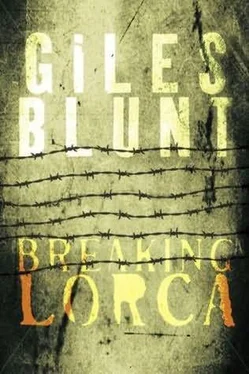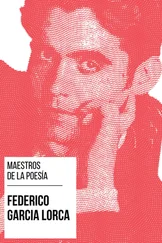Giles Blunt - Breaking Lorca
Здесь есть возможность читать онлайн «Giles Blunt - Breaking Lorca» весь текст электронной книги совершенно бесплатно (целиком полную версию без сокращений). В некоторых случаях можно слушать аудио, скачать через торрент в формате fb2 и присутствует краткое содержание. Жанр: Триллер, на английском языке. Описание произведения, (предисловие) а так же отзывы посетителей доступны на портале библиотеки ЛибКат.
- Название:Breaking Lorca
- Автор:
- Жанр:
- Год:неизвестен
- ISBN:нет данных
- Рейтинг книги:4 / 5. Голосов: 1
-
Избранное:Добавить в избранное
- Отзывы:
-
Ваша оценка:
- 80
- 1
- 2
- 3
- 4
- 5
Breaking Lorca: краткое содержание, описание и аннотация
Предлагаем к чтению аннотацию, описание, краткое содержание или предисловие (зависит от того, что написал сам автор книги «Breaking Lorca»). Если вы не нашли необходимую информацию о книге — напишите в комментариях, мы постараемся отыскать её.
Breaking Lorca — читать онлайн бесплатно полную книгу (весь текст) целиком
Ниже представлен текст книги, разбитый по страницам. Система сохранения места последней прочитанной страницы, позволяет с удобством читать онлайн бесплатно книгу «Breaking Lorca», без необходимости каждый раз заново искать на чём Вы остановились. Поставьте закладку, и сможете в любой момент перейти на страницу, на которой закончили чтение.
Интервал:
Закладка:
Tito gave Perez several light slaps on the cheek, as if reviving him from a faint. “It should be easy for you to smile! No more Submarine! No more tea party! You should be happy! Today you get to go free-unlike your buddies back at the school.”
A row of seats had been reserved for the squad just behind the front row. They filed in and sat down. Captain Pena turned around and looked them over from the front row. He didn’t smile, just nodded at Tito and turned around again to face the stage.
The stage was not large. Most of the space was taken up by flags: the flag of El Salvador, the flag of the United Nations, the flag of the United States. Several dignitaries sat down in the handful of seats. Victor caught a glimpse of blond hair flashing in the sunlight and recognized Mr. Wheat, the American who had visited the little school.
Members of the foreign media, as glamorous to Victor as movie stars, were there in abundance. Photographers crouched before the stage taking preliminary readings. The air was alive with expectation. The band played another march, and Victor rubbed at his knuckles where the woman’s teeth had cut him.
Then the President of El Salvador came out on stage and took a seat. He waved in acknowledgement of the applause, but he did not address the audience. One of his ministers-a balding man in an impeccable pinstripe suit-stood before the microphone. Victor didn’t know his name, but he had seen his photograph many times.
The minister spoke first on the dignity of labour. He noted how the nation could not survive without the people who worked the soil. It was in recognition of this fact that the present administration was committed to land reform. The President nodded his head in agreement; Mr. Wheat stared impassively at the crowd.
“Today’s ceremony,” the minister went on, “is not a great moment in history. We are not gathered at a great turning point. What we celebrate today is simply a quiet example of quiet justice: under our Land to the Tiller program, those who work the land ….” Here he paused for effect. “ …. will own the land.”
Tito and Lopez escorted the two prisoners to the side of the stage. The one-armed prisoner was sent up first, his features fixed in a grotesque jack-o’-lantern smile.
The minister held up a scroll and spoke not to the prisoner but to the audience. “Senor Bartel, this deed transfers ownership of one-tenth of the land you have worked for the past twenty years to you and your family. On this piece of land you may plant what you want. Or, if you choose, you may sell this land for whatever the market will pay. Any profit from this piece of land goes directly into your pocket.”
Turning to the prisoner for the first time, the minister handed him his deed. The prisoner kept smiling and nodding his head. The document joined their two hands, and a lusty round of applause went up. Camera flashes lit the backdrop.
The one-armed prisoner took his seat again, and then a man Victor recognized as General Damont stepped up to the microphone. Damont was in charge of El Salvador’s anti-terrorist strategy. He had a grave, courteous manner. He thanked the minister and the President for teaching him the wisdom of reform. “Justice and wisdom,” the General said, “will win this war for me.” He was completely unfazed by the stage, the crowd, the cameras, pausi ng between sentences with the confidence of a seasoned actor. “Justice and wisdom will take from the terrorists the very ground they stand on. How do I know this? The proof of this, my friends, is the constant stream of defectors from the other side.”
Ignacio Perez was sent up to the stage.
The General faced him, one warrior to another, and placed the microphone between them. “You were a member of the rebel forces, is that correct?”
“Yes, General. That is true.” Perez seemed much more natural than the one-armed man. Nervous, but natural.
“Could someone lower this microphone, please? I want everyone to hear what this man has to say.”
A technician was produced. He lowered the microphone to the prisoner’s height.
“You were a member of the FMLN, is that correct, Senor Perez?”
“Yes, General, I was a member of the FMLN. But I can no longer fight for these people.”
“And why is that? Why can you no longer fight beside them?”
“The last village we were at. The campesinos refused to give them food. So the rebels burned their village to the ground. They killed the old men with bayonets, and they raped all of the girls.”
The General nodded gravely. “Tell me this. Why did you join the rebels in the first place?”
“I joined the rebels for one reason. I joined the rebels because they promised us we would have land. Not a lot, but a piece of land of our own to work.”
“And now, Senor Perez? Now that your own government has promised you a piece of land?”
“Now I will fight for the government.”
“You are volunteering for the army?”
“Yes, General. I regret I ever joined the rebels. They are the enemy of the people and I want to destroy them.”
“Well, you are welcome in my battalion any day.”
The General held his hands up in ostentatious applause. The dignitaries behind him-even the President-rose and clapped their hands. The entire audience rose to its feet and clapped loud and long. Before the applause could subside, the band struck up the theme from Rocky .
The General smiled brilliantly. Seeing this, the prisoner remembered Tito’s warning and he smiled brilliantly too. Then, in what looked like a completely spontaneous bit of theatre, the General hugged him. He would not have done so yesterday, Victor thought, when Perez was filthy from Submarine.
The President gave a short speech after that, thanking the Americans for their help and vowing to continue his struggle for reform.
When they were at the Cherokee again, Tito took the deed from the one-armed prisoner. “You’ll get it back,” he said. “It has to be formally notarized.”
Ignacio Perez made to get back into the Cherokee.
“Where you going, you idiot?”
The prisoner looked at him blankly.
“Don’t you understand anything? You’re free to go.”
“Free?”
“Yes, free. Absolutely and completely free. You are a landowner now. We will have the deed notarized and bring it to you tomorrow.” He reached out and pumped the prisoner’s hand energetically. “So long, Ignacio. No hard feelings, I hope. It’s just war, you know, and war …. war does funny things.”
TWELVE
“Thank you, my children,” Captain Pena said when they were back at the little school. “You were very well behaved, and I’m giving you the afternoon off.”
The men made childish noises of approval, slapping each other and mussing each other’s hair, although none of them touched Victor.
“That’s the good news,” the Captain continued. “The bad news is, you have to work tonight.” The Captain waited for the exaggerated groans to subside. “Tonight we have another ceremony to attend. A very different ceremony. Tonight we will hand over to Senors Bartel and Perez their deeds of property. Fully notarized. Don’t worry, it won’t take long.”
The sun was still strong outside, so Victor took a book and went to sit at the edge of the pasture under a tree. He read a few paragraphs, but it was such a pretty day, he found himself looking up at the white columns of cloud, the deep blue of the sky above the hills. From a nearby hillock, three heifers gazed at him with melancholy eyes.
So far, it had been a better day than most. True, the land ceremony was something of a sham-all right, it was a complete fake-but at least two prisoners had gone free. And now the Sanchez woman was getting the afternoon off. That was a good thing too. He dozed for a while, and woke when he heard his uncle’s footsteps on the gravel road. Victor jumped to his feet and saluted.
Читать дальшеИнтервал:
Закладка:
Похожие книги на «Breaking Lorca»
Представляем Вашему вниманию похожие книги на «Breaking Lorca» списком для выбора. Мы отобрали схожую по названию и смыслу литературу в надежде предоставить читателям больше вариантов отыскать новые, интересные, ещё непрочитанные произведения.
Обсуждение, отзывы о книге «Breaking Lorca» и просто собственные мнения читателей. Оставьте ваши комментарии, напишите, что Вы думаете о произведении, его смысле или главных героях. Укажите что конкретно понравилось, а что нет, и почему Вы так считаете.












